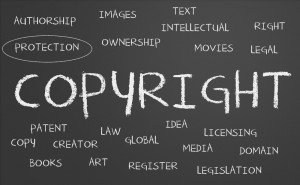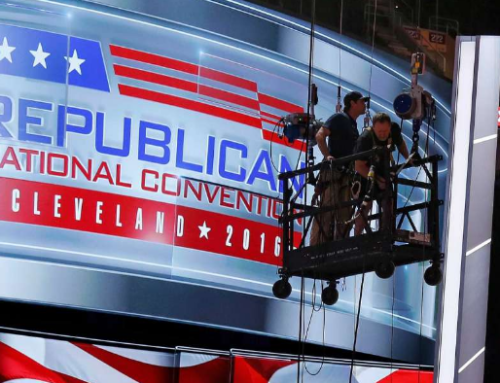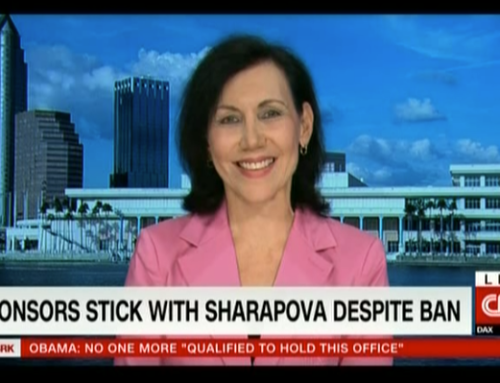That’s right. Unless you have a written transfer of copyrights from the creator, whether an artist, copywriter, video producer, web designer etc., you don’t own squat.
I recently had the pleasure of working with Julee L. Milham an intellectual property attorney, on a song copyright issue. In upcoming blog posts, I will share more about this branding dilemma I faced and the advice Julee provided.
My experience with Julee was excellent. I was very impressed with her knowledge and her level of client service. For a reasonable fee, she quickly provided me counsel and insight on my matter.
I told Julee I was going to blog about my experience with her and asked if she could share some advice that the Karen Post blog readers and others in small business, marketing and branding could gain from. With permission from Julee, here is an important copyright fact every business owner should know about.
When you hire people to create things for you, you don’t own the results unless the transfer of ownership has been agreed to in writing — regardless of how much you pay for the work or what was implied or agreed to verbally.
While that statement sounds unnatural, it’s true. An exception to the rule is when an employee creates something within the scope of his or her job. Under this specific circumstance, you as the employer own legal rights to the work. However, this only applies to true employees (not contract or commissioned labor), and parties often disagree on what’s “within the scope of a job.” Outside of the employee exception, the law says an author (the creator) of a work owns it unless he or she gives it away in writing.
Does anyone take photos for your business? Do you hire contractors to create content for your website or marketing and advertising materials? Without the proper paperwork, the greatest rights you can have in such content is a non-exclusive right to use it. It’s confounding to pay for a job to be done and have ownership still vested with the person you hired.
Transferring copyright in these cases is simple but imperative. This principle runs true all the way down to your personal decisions, such as when you hire a wedding photographer or videographer. After you establish ownership, consider whether you should register any works you create or acquire.
Registration is not required but does provide some advantage- especially in the case of litigation. And before anyone asks, mailing a copy of your work to yourself does not count.
When you hire people to create things for you, you don’t own the results unless you have it in the proper type of writing – no matter how much you pay them or what they said. While that statement sounds unnatural, it’s true. If an employee creates something within the scope of their job, you as employer own it. However, this only applies to true employees (not contract or commissioned labor), and parties often disagree on what’s within the scope of a job. Outside of the employee exception, the law says an author of a work owns it unless he or she gives it away in writing. Does anyone take photos for your business? Or create content for your website or marketing and advertising materials? Without the proper paperwork, the greatest rights you can have in such content is a non-exclusive right to use it. It’s confounding to pay for a job to be done and have ownership still sitting with the service provider. Transferring copyright in these cases is simple but imperative. This principle runs true all the way down to your personal decisions, such as when you hire a wedding photographer or videographer! After you establish ownership, consider whether you should register any works you create or acquire. Registration is not required but does provide some advantages, especially in the case of litigation. And before anyone asks, mailing a copy of your work to yourself does not count.
Julee’s expertise is not limited to general intellectual property law. In fact, she is a specialist in entertainment law. And today with the Internet, the lines between business law and entertainment law are often blurry due to the popularity of audio and broadcast media.
About Julee and her contact info
Julee L. Milham has been practicing law since 1986, primarily in the fields of business, intellectual property, entertainment, alternative dispute resolution, and service to the court. She is board certified in Intellectual Property, AV-rated by Martindale Hubbell, Chair Emeritus of the Florida Bar Entertainment, Arts & Sports Law section, and co-founder of the NYSBA Committee on International Microfinance and Financial Inclusion. Julee is admitted to the bars of Florida, New York, California, and the District of Columbia along with several federal courts. A graduate of Stetson University and Stetson University College of Law, she studied Comparative Human Rights and Corporate Governance at Oxford College of Law in Oxford, England and is admitted to the Roll of Solicitors for England and Wales. Julee can be reached at julee@milhamLaw.com.
If you’ve got a copyright issue or need to protect something you have created and need a trusted legal eagle, I highly recommend Julee.
Brand on!






